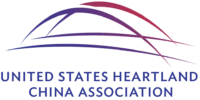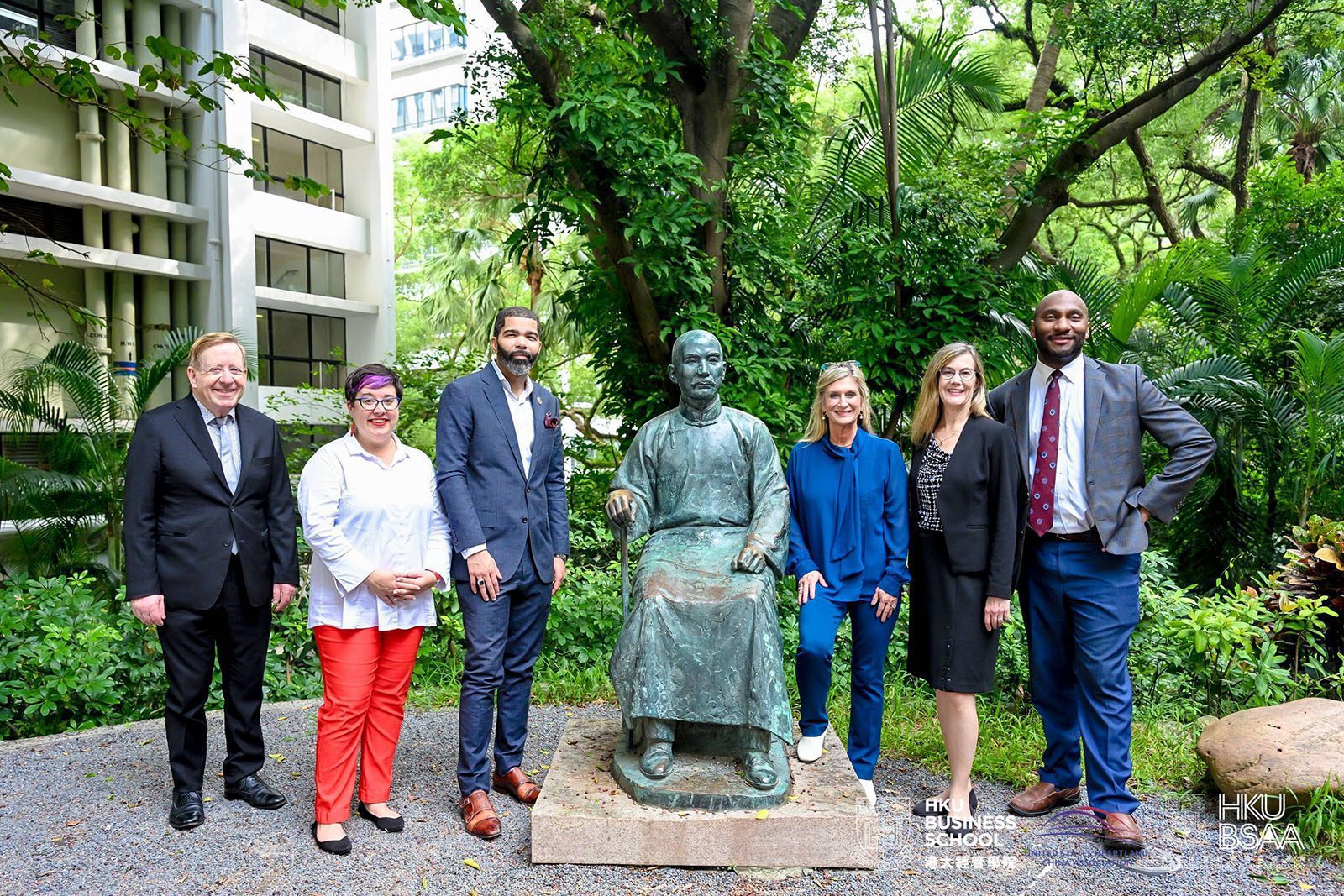Jefferson City, MO (November 24, 2023) – download a .pdf version of this press release
In the first such visit since the pandemic; the U.S. Heartland China Association (USHCA) led a bipartisan delegation of six U.S. mayors representing communities along the Mississippi River Basin to visit their counterparts in the People’s Republic of China. This Mayors’ delegation visit took place in the context of recent visits by Senator Chuck Schumer and a bi-partisan delegation of six U.S. Senators, California Governor Gavin Newsom’s recent trip to China, and the meeting in San Francisco between President Biden and President Xi. Like these national leaders, the mayors went to China to underscore the importance of maintaining open lines of communication between the United States and China.
The delegation included Mayor Jim Brainard of Carmel, Indiana; Mayor Barbara Buffaloe of Columbia, Missouri; Mayor Lee Harris of Shelby County, Tennessee; Mayor Chokwe Lumumba of Jackson, Mississippi; Mayor Kim Norton of Rochester, Minnesota; and Mayor Robyn Tannehill of Oxford, Mississippi. These leaders were selected for this sponsored trip based on their demonstrated thought leadership to represent municipalities of different sizes from the Mississippi River Basin in America’s Heartland. Two science advisors and one expert: Dr. Gabriel M. Filippelli and Dr. Lixin Wang from Indiana University, and Edmund Downie from Princeton University, provided support that ensured successful bilateral engagements.
Over a ten-day period, just as the U.S.-China bilateral working group under the leadership of U.S. Special Envoy for Climate John Kerry and his Chinese counterpart Xie Zhenhua strived to complete the Sunnylands Statement on Enhancing Cooperation to Address the Climate Crisis in California, the Heartland mayors delegation visited five Chinese communities to put the bilateral cooperative framework into action at the local level.
This visit kicked off a historic two-way exchange as part of USHCA’s Yangtze-Mississippi Municipality Energy Transition Exchange project. This project aims to promote city-to-city best practice sharing between the communities along these two major rivers around energy transition, climate mitigation, and green economy.
“Collaboration between U.S. and Chinese Mayors not only benefits the hundreds of millions of people living in our two countries, but the on-going joint work will lead to best practices that can be applied around the world.”
– Mayor Jim Brainard
Carmel, Indiana
USHCA Board co-chair & delegation leader
The mayors touched down first in Hong Kong, where they learned about its unique history as a crucial bridge between the east and the west. Leading experts at the University of Hong Kong shared Hong Kong’s experiences as it embarks on its own decarbonization journey. The U.S. Foreign Commercial Service team from the U.S. Consulate in Hong Kong also arranged for the mayors to meet with local business leaders to explore ways to expand exports and attract investment for each of the U.S. cities.
In the city of Wuhan, which is in the mid-section of the Yangtze River, the delegates were greeted by the Vice Governor of Hubei as well as eight local mayors at the Hubei-Middle America Mayors Roundtable. The U.S. Mayors and their Chinese counterparts shared highlights of their respective cities in a roundtable, followed by an in-depth discussion on opportunities for collaboration, the signing of sister city agreement between the city of Carmel, Indiana and Xiangyang, Hubei, the newest pair of sister cities between the United States and China. The visit to Wuhan also included a field trip to Voyah Automobile, where the mayors tested the latest lineup of its EVs, and a stop at Wuhan University to engage with students.
“As mayor of a city with a major university, I was encouraged to see the potential and desire for two-way education exchanges with both scholarly and cultural benefits.”
– Mayor Robyn Tannehill
Oxford, Mississippi
After a 2.5-hour high-speed train ride traveling along the Yangtze River, the delegation arrived in Nanjing, the capital of Jiangsu Province. The Mayor and Deputy Mayor of Nanjing welcomed the U.S. Heartland Mayors and invited them to further explore opportunities for collaboration. The delegation visited an electric bus charging station for Nanjing’s fleet of EV buses. At the Xiaoxihu Neighborhood, a local developer explained how the Neighborhood Regeneration project, a unique public-private partnership project, had won the UNESCO Asia-Pacific Award for Cultural Heritage Conservation for its innovative approaches to urban renewal. The visit to Nanjing ended with the Nanjing-U.S. Heartland Cities Business Forum, where different branches and departments of the local government joined the Deputy Mayor of Nanjing to share their roles & responsibilities to help Nanjing achieve its sustainable development goals. Mayor Tishaura Jones of St. Louis, Nanjing’s sister city, sent a virtual greeting for the forum. Leaders from the renowned Johns-Hopkins Nanjing Center also joined the forum to inform the mayors of its unique, dual-language program, which has trained many generations of experts on U.S.-China relations. This forum was yet another opportunity for the Heartland Mayors to promote their cities, including their unique culture, business environments, and leading educational institutions.
“Our Chinese colleagues clearly wanted to share and learn. I was impressed with their eagerness to enter a dialogue.”
– Mayor Barbara Buffaloe
Columbia, Missouri
In the city of Suzhou, further down the Yangtze River, the Heartland Mayors were joined by over 100 state and local government representatives and sister city committee delegates from across the U.S. at the 5th China-U.S. Sister Cities Conference. All six Heartland mayors spoke on three concurrent panels: Economy & Employment, Education & Youth, and Climate Change & Environmental Protection. The conference was followed by a collection of activities to showcase Suzhou, including Zhouzhuang Ancient Town, a UNESCO Cultural Heritage site; a special performance by the Suzhou Symphony Orchestra at the Suzhou Culture and Arts Center; Duke Kunshan University; and Starbucks China Coffee Innovation Park. An entire afternoon in Suzhou was devoted to learning about how the Xiangcheng District of Suzhou is using centralized energy supply solutions and advanced energy saving technologies to provide heating and cooling to whole city blocks. Additional sharing and learning took place at a roundtable discussion on Suzhou’s Future Development and New Growth Engine at the Yangtze River Delta Carbon Neutrality Strategy Development Institute hosted by the Southeast University.
“Both countries have a lot to learn from each other about topics that affect our cities every day, from new technologies on climate change to innovations in health care.”
– Mayor Kim Norton
Rochester, Minnesota
On the way to the final stop of this trip, Shanghai, the delegation visited Chongming Dongtan National Nature Reserve, Shanghai Aquatic Wildlife and Plant Conservation Research Center, as well as a rural domestic wastewater treatment station. Upon arriving in Shanghai, the delegation joined a reception with U.S. Ambassador to China Nicholas Burns, U.S. Consul General to Shanghai Scott Walker, and a visiting delegation of U.S. Agricultural Trade representatives. Over 100 U.S. delegates converged in Shanghai to show support for the first U.S. Department of Agriculture (USDA) U.S. Food and Agriculture Pavilion at the China International Import Expo (CIIE), one of the largest trade shows where exporters from around the world come to develop markets in China. Ambassador Burns and USDA Acting Deputy Under Secretary for Trade and Foreign Agricultural Affairs Jason Hafemeister attended the Opening Ceremony. In 2022, U.S agriculture exports to China were $40.8 billion, making China the largest U.S. agriculture export market for the second consecutive year.
“We had several opportunities on our visit to meet with local and regional leaders, academic experts, and business leaders from America’s agricultural and logistics industries. The visit was important and informative, as we talked about how they manage problems that are very similar to the problems in the United State and opened the lines of communication for potential city-to-city alliances that could help lift the economy of Memphis and Shelby County.”
– Mayor Lee Harris
Shelby County, Tennessee
The capstone of the trip was the Yangtze-Mississippi Forum, where subject matter experts from both the U.S. and China presented their insights around climate impact on the river basin ecosystem, green development along river basins, legislative approach to protect the environment, and new findings around coastal resilience of delta areas. The Yangtze-Mississippi Forum ended with Roundtable Discussions on Cooperation Mechanisms in the Large River Basins where the heartland mayors spoke about their experiences addressing climate change in their local community, and how shared challenges in these communities can enable subnational leaders to develop shared solutions. On the last day in Shanghai, McKinsey & Company’s Shanghai Office hosted the delegation for further discussion about China’s efforts to address climate change issues and potential to bring some innovative solutions they saw to the Mississippi River Communities.
“Our Chinese hosts showed great interest, a desire to work together to solve mutual problems and incredible hospitality. I’m looking forward to hosting and showing off our U.S. cities to a Chinese delegation next year; and to our continued collaboration to work together and find solutions to these critical issues in climate change.”
– Mayor Chokwe Lumumba
Jackson, Mississippi
The mayors returned home equipped with new ideas for promoting economic growth and sustainable development in their respective communities as well as newfound, collaborative relationships they plan to continue with dozens of Chinese counterparts.
“USHCA is pleased to support open lines of communication with the People’s Republic of China through pragmatic sub-national dialogues around shared challenges,” remarked Min Fan, USHCA Executive Director who oversaw the organization of this historic delegation. “We wish to thank the Ford Foundation, Henry Luce Foundation, Carnegie Corporation of New York, and Energy Foundation China for their support that made this delegation possible and the National Committee for U.S.-China Relations for sharing its expertise in leading delegations to China.”
In partnership with the six mayors, USHCA plans to host a reciprocal delegation of Chinese city leaders in Fall 2024, convening the next Yangtze-Mississippi Forum in the American Heartland. The next Yangtze-Mississippi Forum will continue the dialogue and best practice sharing between the two river basin communities to find innovative solutions to shared challenges our communities face.
About USHCA
United States Heartland China Association (USHCA) is a bipartisan nonprofit organization committed to promoting exchanges in culture, education, and business between the American Heartland Region and China. USHCA promotes a stable and productive U.S.-China relationship to protect and advance the interests of the American Heartland so that:
- Farmers in the Heartland can continue to expand our export to China.
- Educational institutions in the Heartland can remain competitive and continue to attract the best talent from around the world, including China, where the highest percentage of our international students is from.
- Heartland community and leaders have the resources to better understand and engage China.
- Companies headquartered in the Heartland can remain competitive in the global economy.
- Heartland students can have the opportunities to develop a global mindset through learning about the Chinese language and culture.
We are funded by American sources including membership dues, Heartland community supporters, private donations, grants from private foundations, corporate sponsors, and contributions from state governmental agencies. As a tax-exempt 501(c)(3) organization, USHCA does no lobbying.


